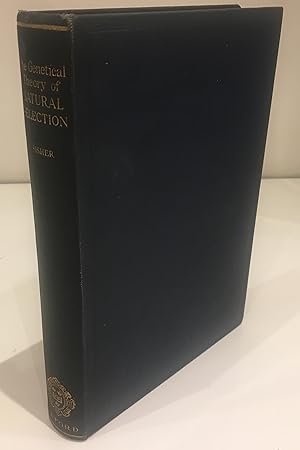Descripción
First edition, an excellent copy with distinguished provenance; copies in such fine condition are rare in commerce. "The locus classicus for the reconciliation of Darwinian natural selection and Mendelian heredity" (DSB), and "arguably the deepest and most influential book on evolution since Darwin" (Crowe, 'R. A. Fisher, a centennial view,' Genetics 124 (1990), 207-211). "The Genetical Theory of Natural Selection is celebrated as the first major work to provide a synthesis of Darwinian selection and Mendelian genetics. Its publication in 1930 marked a turning point in the development of evolutionary thought, contributing fundamentally to the renaissance of Darwinism following a long period of neglect. It is a work remarkable for what it reveals of Fisher's creative genius and his insight into many of the problems facing evolutionary biologists today" (Bennett (ed.), Natural Selection, Heredity and Eugenics, 1983). The most famous result in the book is Fisher's 'fundamental theorem of natural selection': the rate of increase in fitness of any organism at any time is equal to its genetic variance in fitness at that time. Fisher likened it to the law of entropy in physics, stating that "It is not a little instructive that so similar a law should hold the supreme position among the biological sciences". "[In addition to enunciating the fundamental theorem of natural selection, Fisher] developed a totally novel way (now standard) for determining the probability of survival of a mutant gene. He worked out the partial differential equation for gene-frequency change, using a trigonometric transformation that made the variance independent of the allele frequencies. He generalized Haldane's formula for the probability of survival of a mutant gene, making it possible to treat deleterious as well as favorable mutants. The formula, further improved by Malécot and Kimura, plays a crucial role in the analytical treatment of the neutral theory of molecular evolution. He worked out the stationary distribution of allele frequencies. He gave us the first quantitative theories of sexual selection, mimicry, polymorphism, evolution of recombination rates, and supergenes. He explained why the sex ratio is nearly 1:1 even in highly polygamous species a problem that baffled Darwin and that provides one of the best illustrations that natural selection does not always do what is best for the species. In doing this, Fisher introduced the concept of parental expenditure, thereby seeding a cloudburst of ecological literature. Rarely have so many new and deep ideas been put into a single book" (Crow, 'Fisher's contributions to genetics and evolution,' Theor. Pop. Biol. 38 (1990), 263-275). Ronald Aylmer Fisher was born in London in 1890, and died in Adelaide in 1962. In addition to his seminal contributions to evolutionary genetics, it is now generally accepted by historians of statistics that his contributions to that subject place him alongside Laplace (1749-1827) and Gauss (1777-1855). ABPC/RBH list only three copies in the last half-century. Provenance: Charles Haskell Danforth (1883-1969), American anatomist and professor at Stanford University (ink name stamp on front paste-down and front free endpaper). "Much of Danforth's research dealt with problems of inheritance, including such topics as the mechanism and heredity of human twinning, mutation frequency in man, genetic endocrine balance in birds and mammals, the genetics of mice, human heredity, morphology, and racial differences in man. Indeed, the wide range of his research interests led him to be at home in several different fields, including, besides anatomy and genetics, endocrinology and physical anthropology" (DSB). 8vo, pp. [ii], [i-vii], viii-xiv, 1-156, [2], 157-272, with two full-page coloured plates, one placed as frontispiece, the other opposite p. 156 (a few marginal annotations in pencil, presumably by Danforth). Publisher's blind-ruled cloth, spine lettered in gilt (slightly rubbed. N° de ref. del artículo ABE-1636453709595
Contactar al vendedor
Denunciar este artículo
![]()


